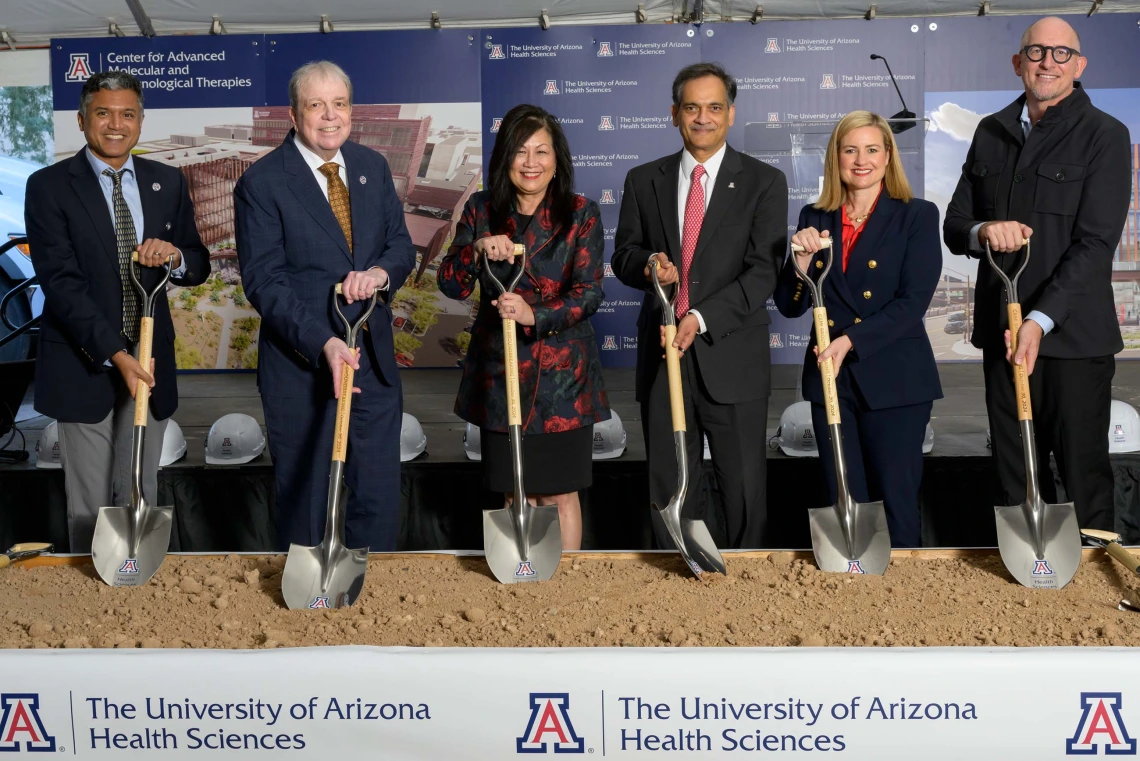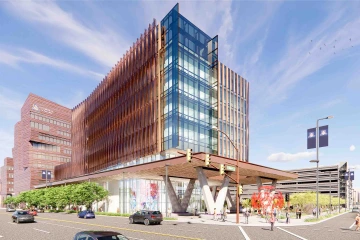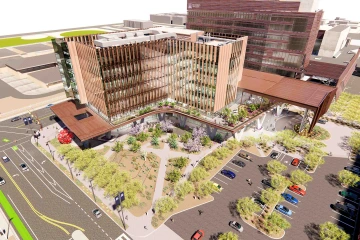U of A Health Sciences breaks ground on the Center for Advanced Molecular and Immunological Therapies
An Oct. 30 groundbreaking ceremony marked the next step for CAMI, a biomedical research hub to be located on the Phoenix Bioscience Core.

The University of Arizona Health Sciences held a groundbreaking ceremony for its new Center for Advanced Molecular and Immunological Therapies building Oct. 30. Attendees and speakers included: (from left) CAMI Inaugural Executive Director Deepta Bhattacharya, PhD, a professor of immunobiology at the College of Medicine – Tucson; University of Arizona Health Sciences Senior Vice President Michael D. Dake, MD; Arizona Board of Regents Chair Cecelia Mata; University of Arizona President Suresh Garimella, PhD; City of Phoenix Mayor Kate Gallego; and SmithGroup Design Director Mark Kranz, FAIA.
Photo by Kris Hanning, U of A Health Sciences Office of Communications
Construction is underway on the new building that will house the University of Arizona Health Sciences Center for Advanced Molecular and Immunological Therapies, or CAMI, on the Phoenix Bioscience Core in downtown Phoenix.

The Center for Advanced Molecular and Immunological Therapies will be located at the corner and Seventh and Fillmore streets on the Phoenix Bioscience Core.
Illustration courtesy of McCarthy + SmithGroup
CAMI will anchor an innovation district that aims to establish the Phoenix Bioscience Core as a hub of cell and gene therapy research, startup activity and corporate engagement. Located at the corner of Seventh and Fillmore streets, CAMI will be adjacent to the Biomedical Sciences Partnership Building that houses the U of A College of Medicine – Phoenix.
“A strong life sciences innovation ecosystem is vital for Arizona’s future, both for the health care our population will need and for the economic development opportunities necessary for the state to thrive,” said University of Arizona President Suresh Garimella, PhD. “As the home to the southwest’s leading academic medical center, the University of Arizona is in the perfect position to lead the way, and CAMI is a vital part of this.”
A groundbreaking was held Oct. 30 for the more than 200,000-square-foot, seven-story building that will house research laboratories, a clinical suite, administrative and meeting spaces, and an urban garden and café. The building is expected to be completed in 2027.
“The dream of CAMI started to become a reality with initial support from the Arizona Board of Regents’ New Economy Initiative. Additional funding from the state, county and city, as well as philanthropic donations, has made this important step forward possible. We are grateful to everyone who has supported CAMI’s mission and to McCarthy + SmithGroup for helping bring our vision to life,” said Michael D. Dake, MD, senior vice president for the U of A Health Sciences. “Through CAMI, we will be able to capitalize on the research and expertise at the University of Arizona Health Sciences and become a national leader in advanced immunotherapies research and treatments.”

The organic shape of the design is driven by pedestrian flows and the new urban garden, with significant shaded space and opportunities for outdoor events, seating and dining.
Illustration courtesy of McCarthy + SmithGroup
CAMI builds on the idea that the most effective defense against health issues is the body’s natural immune system. CAMI’s goal is to develop new strategies for the diagnosis, prevention and treatment of cancers, infectious diseases and autoimmune conditions.
CAMI will accelerate the pursuit of therapies by bringing in new ideas and advancing research already underway at the University of Arizona Health Sciences to improve health outcomes for people across Arizona and around the world.
“CAMI presents a significant opportunity to move the basic immunological discoveries being made at the University of Arizona and our partner institutions into new therapies for infectious diseases, autoimmune conditions and cancers,” said Deepta Bhattacharya, PhD, inaugural executive director of CAMI and a professor of immunobiology at the College of Medicine – Tucson. “I am looking forward to the new collaborations CAMI sparks, not only in research but also in clinical investigation and entrepreneurship, that will allow us to take these basic findings across the finish line and start new companies focused on the diagnosis, prevention and treatment of diseases with an immunological basis.”
The CAMI building is being designed and constructed by the design-build team of McCarthy + SmithGroup. Both McCarthy Building Companies, Inc. and SmithGroup are nationally recognized, Phoenix-based firms with expertise in designing and building educational and research facilities.
McCarthy + SmithGroup designed and built the award-winning U of A’s Applied Research Building, which is the first building in the country to house all research spaces related to the fabrication and testing of satellites in one integrated facility.
During the construction process, CAMI research is being conducted on the second floor of the Biomedical Sciences Partnership Building at 475 N. Fifth Street, which houses laboratory and administrative space for CAMI scientists.
Experts
Deepta Bhattacharya, PhD
Inaugural Executive Director, Center for Advanced Molecular and Immunological Therapies, U of A Health Sciences
Professor, Immunobiology, College of Medicine – Tucson
Professor, Surgery, College of Medicine – Tucson
Member, U of A Cancer Center
Member, BIO5 Institute
Contact
Phil Villarreal
U of A Health Sciences Office of Communications
520-403-1986, pvillarreal@arizona.edu

